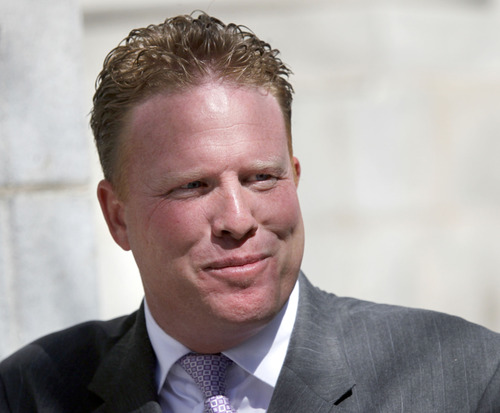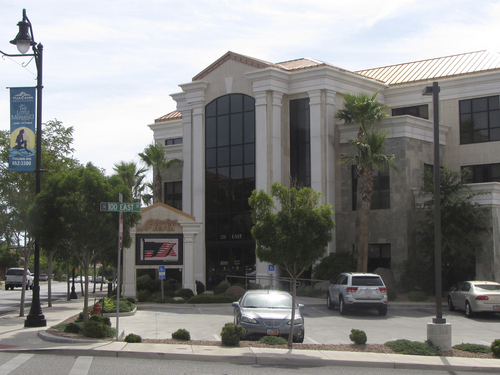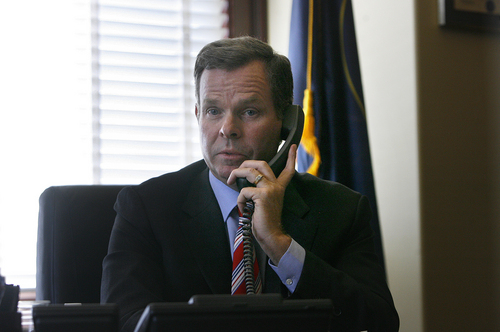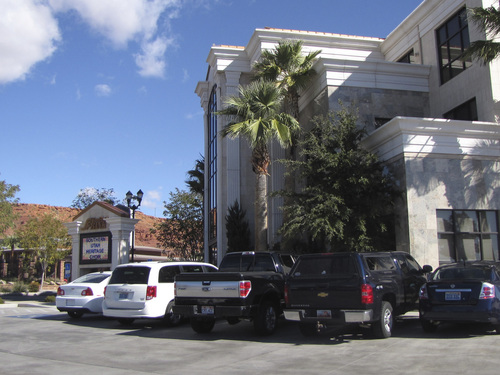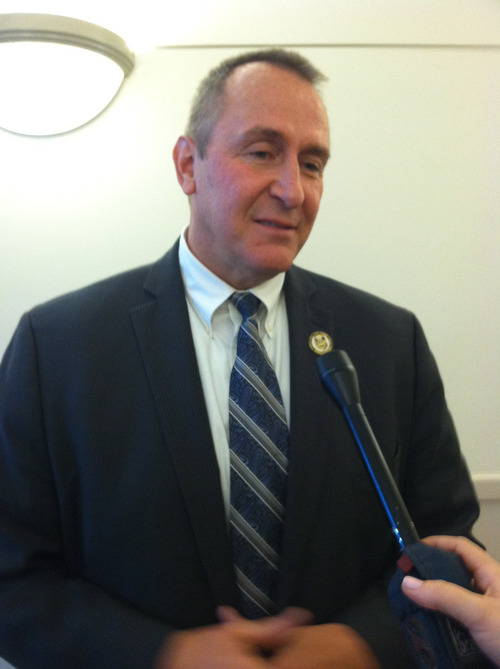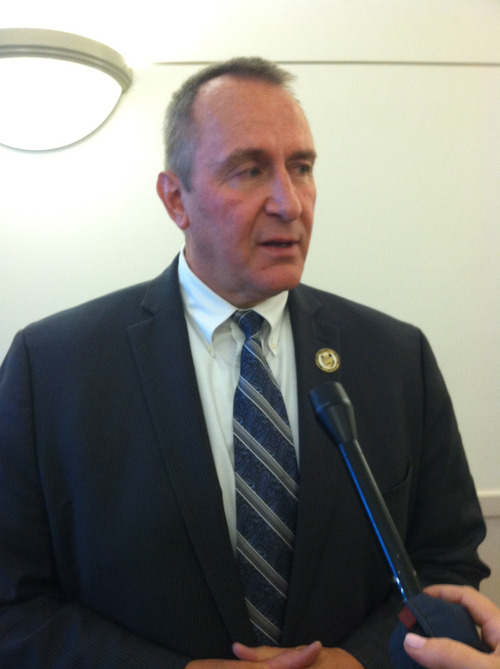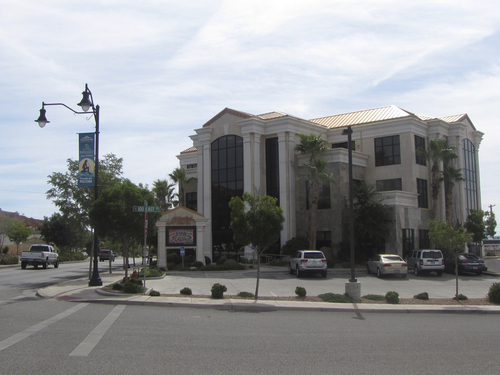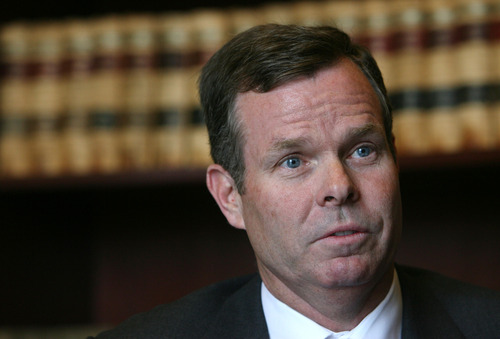This is an archived article that was published on sltrib.com in 2013, and information in the article may be outdated. It is provided only for personal research purposes and may not be reprinted.
Cha-ching!
So went the sound of money rolling into St. George's SunFirst Bank. Lots of it. From across the nation. Tens of millions of dollars coming in, going out.
It lasted from late 2009 for almost a year. But at some point early on, the poker companies shuffling all that cash wanted assurances that processing online player payments in Utah — a state, ironically, dead set against gambling — was indeed legal, even though they already had convinced St. George businessman Jeremy Johnson, his partners and bank officials that it was.
So to whom did they turn? Perhaps even more ironically, to two of the state's top cops: Attorney General Mark Shurtleff and his chief deputy John Swallow.
For some, including the attorney SunFirst asked to review the legal issues, the answer wasn't in the cards, it was in the Utah Code.
"I said this is against Utah law, your bank is in Utah and Utah criminal law says gambling is [illegal], and even anything that facilitates gambling," said Scott Clark, of Salt Lake City's Ray Quinney & Nebeker. "Utah is the last place they could do that."
The supervisor of banks for the Utah Department of Financial Institutions also expressed concerns. And the U.S. Justice Department was determined to shut down what it deemed a criminal activity.
But from Shurtleff and Swallow came silence or, at the most, qualified answers. And the two never launched investigations themselves nor informed federal authorities about the questionable poker payments.
So the money continued to flow — until federal regulators and prosecutors stepped in and all bets were off.
—
Anteing up • Before winding its way through Utah, the tale of online poker and the processing of player payments — told in hundreds of pages of legal documents, emails and interviews — had many starts and stops.
Running a poker business is unlawful under the Illegal Gambling Business Act of 1970 if the state where it is being played prohibits it. To enforce that law in the Internet age, Congress in 2006 passed the Unlawful Internet Gambling Enforcement Act, which bars acceptance of certain types of payments in connection with any illegal wagering.
Still, offshore online companies PokerStars, Full Tilt Poker and Absolute Poker continued to process payments in the U.S. through an Australian outfit that turned for help to Floridian Curtis Pope and his partner, Logan businessman John Scott Clark, who owned a payday-loan business.
In early 2008, Chad Elie, then a Florida resident, entered the picture. Elie had worked with Pope in online marketing and, together with Clark, the trio set up poker-processing accounts at banks.
In August of that year, Elie, Clark and a man named Jeff Nelson opened an account at the National Bank of California. Jeremy Johnson later was substituted on the account for Clark and Nelson as guarantor.
Elie's Viable Processing Solutions began passing payments for online poker companies through the bank, claiming the transactions were for payday loans. (Johnson has said he also was told those were payday-loan transactions.)
In about four weeks, National Bank of California processed about $16 million in online-poker payments until the bank discovered the true origin of the monies, halted the practice and informed the FBI.
Federal agents had been investigating online gambling since at least 2006 and had racked up a string of arrests and seizures, including monies from accounts belonging to Clark and Elie.
—
Dealing them in • Johnson and Elie apparently met in early 2009 to discuss a new strategy, one that would involve "transparent processing" of poker payments at a struggling bank in Johnson's hometown of St. George.
SunFirst had bet heavily on home loans in booming southwestern Utah. When that bubble burst, officers scrambled to raise additional capital to keep the bank afloat.
Intabill, the Australian payment-processing company, collapsed in late 2008. The poker outlets were out millions, and the FBI continued to seize their monies in U.S. accounts.
Johnson and his I Works company were stressed, too. Banks were closing I Works accounts and placing it on a black list because of its high volume of chargebacks from customers, a trend that eventually led to a lawsuit by federal regulators.
The poker companies, Johnson and his partners told SunFirst about their new plan for processing online poker payments: Be upfront. Be transparent. Their argument: Online poker wasn't gambling. It was a game of skill, not chance. Thus, taking payments from it wasn't illegal, they said, if the processors were truthful in telling banks where the money originated.
Johnson and Elie, along with Elie's processing partner, Andrew Thornhill, approached John Campos, vice chairman of SunFirst, with their idea. They reached an agreement to process poker payments in exchange for a $10 million investment in the bank.
Elie stepped into the background to become a "silent partner" in the SunFirst venture after the FBI seized funds from accounts he set up at New York's Fifth Third Bank.
In September 2009, Elie forwarded to Johnson a 28-page opinion from Ian J. Imrich, longtime Los Angeles attorney for Full Tilt Poker, arguing why online poker was legal in the United States — with a brief mention of Utah that cited a 1928 case.
Johnson forwarded the document to Campos, who sent it to others at SunFirst. It made its way to the bank's Salt Lake City attorney, Scott Clark. (No relation to Logan businessman John Scott Clark.)
"I cannot conclude that Utah law would deem poker, if played for money or credits, would be a game of skill only," wrote Clark, who warned that "proceeds from gambling in possession of the bank would be subject to seizure or forfeiture if the Utah court found that the gambling violated Utah law."
The Imrich opinion also went to Tom Bay, supervisor of banks at the Utah Department of Financial Institutions, whose agency is represented by the state attorney general's office.
In a Sept. 30, 2009, email to SunFirst's president, Bay pointed to the "Utah prohibition against gambling" and said the bank's acceptance of poker payments could damage its reputation and draw the interest of law enforcement.
Despite those warnings, despite the seizures elsewhere and despite the arrests, SunFirst, Johnson, Elie and their partners went ahead in late November or early December 2009 and began processing poker payments through SunFirst.
Elie continued processing disguised poker payments through Fifth Third Bank and Bank of America until the feds froze those accounts in September 2009 and the next month seized $8.6 million.
In December 2009, the feds indicted Pope. By mid-December, Thornhill had to abandon the SunFirst processing effort after his arrest on charges also related to previous poker processing. Earlier that year, in June, a federal jury indicted Clark on processing-related charges.
—
The Swallow-Shurtleff gambit • In 2010, several months after the SunFirst processing had begun, poker attorneys asked Johnson to connect them to the Utah attorney general to secure a favorable opinion about the legality of online poker and, therefore, accepting payments in a Utah bank.
Johnson turned to Swallow, Shurtleff's top deputy and handpicked successor, as an intermediary to the attorney general. Johnson and Swallow had connected previously when Swallow was a principal political fundraiser for Shurtleff.
In January 2009, one of Shurtleff's political action committees had received $100,000 from entities related to Johnson and I Works. After Shurtleff said he was considering a bid to oust then-U.S. Sen. Bob Bennett, R-Utah, two of the attorney general's PACs took in an additional $52,700 in Johnson-related donations.
The two men also developed a personal rapport. Shurtleff was photographed sitting in Johnson's yellow Lamborghini with the I Works corporate jet in the background.
Shurtleff and Swallow met on April 1, 2010, with poker-company lawyers and the Poker Players Alliance in the attorney general's office, according to documents obtained through an open-records request.
In emails that day, John Pappas, executive director of the alliance, told Johnson that Shurtleff and Swallow had warned that an opinion from the attorney general asserting the legality of online poker could backfire and "might cause members of the Legislature to demand a change in the law to make it more clear that poker was illegal."
All the while, more red flags kept popping up. SunFirst received subpoenas from two U.S. attorney's offices related to poker processing. Daniel Tzvetkoff, the head of the Australian processing company, was indicted.
Several independent opinions the poker companies solicited did say poker processing likely would be declared legal if the issue came before a court. But one, from the firm of former U.S. Attorney General John Ashcroft, also cautioned that the Justice Department treated the practice as illegal.
In July 2010, Campos and a poker company attorney were stopped in the airport in New York and questioned by FBI agents. Still, SunFirst continued to process poker payments.
Finally, pressed for an answer, Swallow on July 5, 2010, wrote an email to Johnson on poker processing: "Jeremy, I am not aware of any such law in Utah to prohibit what you are doing. I'll have one of our assistant attorneys general look into it tomorrow. Let's talk tomorrow."
Johnson, now under a court order to keep silent, has said that email and a subsequent phone call convinced him that the Utah attorney general's office had given the processing a green light.
Elie has said in a series of Tweets and messages that Shurtleff and Swallow did provide the "go-ahead" for processing. Elie recently finished serving a short prison sentence after pleading guilty in a New York federal court to charges related to processing of online-poker payments.
Swallow, who took over as attorney general in January, turned down a request for an interview, but his attorney, Rod Snow, said his client did not approve poker-payment processing and suggested the email Johnson was relying on was more like a "gentle letdown" that no support would be forthcoming.
"Clearly that email is not a go-ahead," Snow said. "That's the answer any lawyer would say: 'I'm not aware but I'll have to look.' "
Shurtleff maintains he never was asked by poker company attorneys about the legality of processing payments, only about the playing of online poker itself.
He said running a poker business was clearly illegal in Utah. As for processing poker payments, he told The Salt Lake Tribune that probably was illegal as well. But that became clear, he added, only with a 2012 amendment to the Utah Code that specifically banned gambling through the Internet.
—
Time to fold • After four years of federal arrests and seizures of millions of poker dollars, after SunFirst's own attorney said processing was illegal and after the state's top bank examiner expressed doubts, neither Shurtleff nor Swallow initiated an investigation. Nor does it appear, based on their statements and on documents from an open-records request, that they referred questions to other Utah or federal officials.
Snow, Swallow's lawyer, said any investigatory or other actions that might have been appropriate at that time would have had to come from the attorney general or his chief deputy for criminal matters, not from Swallow, who oversaw civil matters.
Shurtleff explained that an investigation was up to either the federal authorities — who in 2011 charged Elie and, in the SunFirst operation, Campos — or the Washington County attorney, who had jurisdiction because a gambling violation is a misdemeanor under state law.
"If feds prosecute bank robbery, states and counties don't also prosecute the same robbery," Shurtleff said. "If more could have (and I'm not saying more could until the Legislature specifically added Internet gambling to the code) or should have [been done], it would have fallen to the Washington County attorney to make a decision on a class B misdemeanor."
Scott Clark, the former SunFirst attorney, called such a stance "ridiculous."
Clark likened Shurtleff's argument to a crook counterfeiting on a Utah Indian reservation. Such a crime violates federal law while passing phoney money breaks state law.
"So if you were to follow the Shurtleff line of reasoning," Clark said, "You would say, 'Well we're waiting for the feds to go in and shut down the counterfeiters. It's, after all, an Indian reservation. And we could prosecute because, after all, the bills are showing up in Roosevelt. But we're not going to. We're going to let the federal government. We're going to let them come to their senses and do something about it.' Well, that would never happen. They would go in and say, 'Where did this money come from?' They would call the FBI and close down the operation."
By the time federal regulators acted against SunFirst, the bank had processed more than $200 million in poker payments. In November 2011, state regulators closed SunFirst and sold its assets to Cache Valley Bank.
tharvey@sltrib.comTwitter: @TomHarveySltrib


